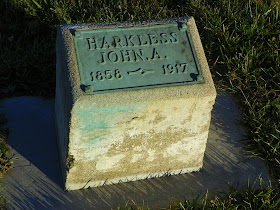At long last I can finally announce that we're finished with Haunted Noble County, Indiana!
I mean, of course, until I get edits back from the publisher. Emily finished her go-through, correcting all my small mistakes and showing me the big mistakes to correct. By the time you read this, our editor at The History Press will be shaking his head and muttering, "You had a whole year, and couldn't clean it up better than this?"
Well, I hope that's not what he's saying.
This is the longest it's ever taken me to write a book, with the exception of Smoky Days and Sleepless Nights. In both cases that includes long delays in which nothing got done at all. Not my fault! Mostly.
Then there were the pictures. We planned on about thirty, most taken by Emily and me; we turned in fifty.
 |
| Photography wasn't all that easy when John A. Harkless was doing it. |
That's the tombstone of John A. Harkless, a photographer who should get his own credit in the book. For this book and for Images of America: Albion and Noble County, we depended on several local sources for historical photos. But most of the older photos, at least from the Albion area, originated with Harkless.
It wasn't unusual for us to find the same photo in more than one collection--sometimes from four or five sources. In that case, we credited the first place we found it. Often that was the Noble County Historical Society (which operates the Old Jail Museum), or the collections of Mike Mapes and Grace Leatherman, or the Stone's Trace Historical Society.
The funny thing is that Haunted Noble County, Indiana isn't an historical book, really. It's supposed to be about ghosts and haunted places, and that means places that are haunted today, doesn't it? But I love to research, and I love history. Whenever we encountered a local ghost story I couldn't help thinking: What events let to a spirit hanging around? How long have they been there? What was the place like when they were alive?
 |
| We found this photo of the Wolf Lake Onion Parade in three places, although first through the Noble County Historical Society. |
Well, if you love researching, and you get a chance to research, what happens? That's right: rabbit hole. A lot of rabbit holes.
It's not the only thing that delayed the project, of course. I've mentioned before our visit from COVID, which overstayed its welcome. We got so delayed that when I finally saw the finish line, I realized I had to make a dash to reach it. Or, to put it another way, the deadline was approaching like Godzilla on a bender.
 |
| This photo was in Mike Mapes' massive collection. (Just to clarify, none of the photos in this blog are in the book--they're just examples of what great history people have preserved.) |
So once again--I said the same thing in May--sorry to anyone I didn't reconnect with before it was too late. Also, thank you to those I did connect with, and there were many, and thank you again for all those history buffs who helped lead me down those various rabbit holes. Sometimes I ended up in areas that didn't add to this project, but that doesn't mean they weren't fun.
 |
| The Stone's Trace Historical Society had this photo of downtown Ligonier. |
And when will the results of our hard work be revealed to the world? Well ... I did mention that we missed deadlines, right? Our editor was very understanding, but the world of traditional publishing plods on like an old plow horse, and I wouldn't expect to see it before the spring of 2025--maybe later. I'll keep you updated.
- Amazon: https://www.amazon.com/-/e/B0058CL6OO
- Barnes & Noble: https://www.barnesandnoble.com/s/"Mark R Hunter"
- Goodreads: https://www.goodreads.com/author/show/4898846.Mark_R_Hunter
- Blog: https://markrhunter.blogspot.com/
- Website: http://www.markrhunter.com/
- Instagram: https://www.instagram.com/ozma914/
- Facebook: https://www.facebook.com/MarkRHunter914
- Linkedin: https://www.linkedin.com/in/markrhunter/
- Twitter: https://twitter.com/MarkRHunter
- Youtube: https://www.youtube.com/@MarkRHunter
- Substack: https://substack.com/@markrhunter
- Tumblr: https://www.tumblr.com/ozma914
- Smashwords: https://www.smashwords.com/profile/view/ozma914
Remember: Every time you read a book, an ancestor smiles in their grave. Which is actually kind of scary.
No comments:
Post a Comment